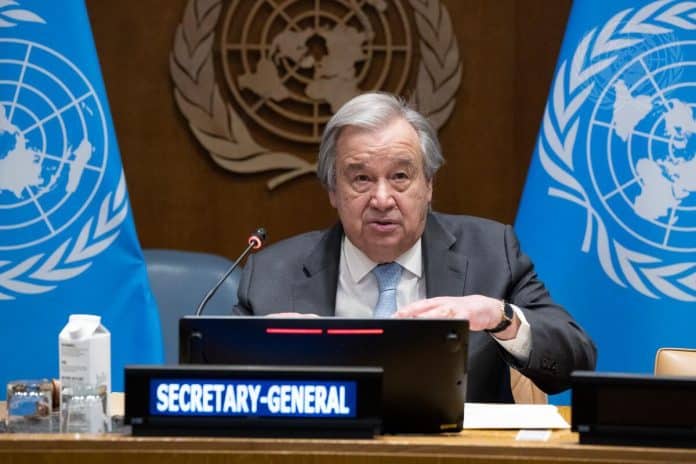THE SECRETARY-GENERAL
—
REMARKS FOR THE HIGH-LEVEL EVENT OF THE GENERAL ASSEMBLY ON THE ZERO-WASTE PROJECT
New York, 30 March 2023
[Bilingual, as delivered]
Excellencies, ladies and gentlemen,
Thank you for coming together to mark the first International Zero-Waste Day.
I want to recognize and salute the leadership of the government of Türkiye and First Lady, Her Excellency Emine Erdoğan on this vital issue.
Excellencies,
Humanity is treating our planet like a garbage dump.
We are trashing our only home.
We’re spewing a torrent of waste and pollution that is affecting our environment, our economies, and our health.
Plastics, textiles, rotting food, discarded electronics and batteries, debris from mining and construction sites, abandoned chemical containers — the list goes on.
According to the World Bank, the world generates 2 billion tonnes of municipal solid waste every year — and 33 per cent of that is not properly managed in controlled facilities.
Every minute, the equivalent of one garbage truck full of plastic is dumped into the ocean.
Pollution and chemicals are poisoning our water, air and soil.
Meanwhile, a staggering 10 per cent of all global greenhouse gas emissions comes from growing, storing and transporting food that is never used.
An outrage when more than 800 million people around the world go hungry every year.
And poorly managed waste is the third-largest global emitter of methane.
A travesty in the wake of last week’s IPCC report, which shows we are running out of time to avoid climate catastrophe.
And a huge missed opportunity when we consider that reducing waste globally would have a transformative impact on carbon emissions.
Excellencies,
Waste is a killer.
Of people.
Of our planet.
Of our natural resources and ecosystems.
Of economies, which lose billions each year from waste.
And the gobs of garbage keep growing.
By 2050, municipal solid waste will double to 4 billion tonnes each year.
Garbage is laying waste to our planet.
It’s time to fight back, and launch a war on waste on three fronts.
First, polluters themselves must take the lead.
Those who produce waste must design products and services that are less resource and material intensive, smartly manage any waste created across all stages of their products’ lifecycle, and find creative ways to extend the lives of the products they sell.
And they need to invest in waste management, recovery and recycling systems in the communities in which they operate.
Second, we need to massively invest in the ability of countries, cities and local governments to develop and scale-up modern waste management systems, and policies that encourage people to re-use and recycle everything from plastic bottles to ageing electronics.
They should follow the lead of cities like Kigali, Kamikatsu and Ljubljana, all of which are strengthening their municipal waste management systems by recycling 50 to 80 per cent of their waste.
And at the national level, countries should take inspiration from other examples like Türkiye’s Zero Waste project spearheaded by the First Lady.
In this context, I am pleased to announce that I am establishing an Advisory Board of Eminent Persons on Zero Waste.
I thank Her Excellency the First Lady of Türkiye for agreeing to chair this important initiative – along with Mr. Jose Manuel Moller, CEO and Founder of Algramo, as vice-chair.
The Advisory Board will share success stories of national and local zero-waste initiatives.
Excellences,
Troisièmement, en tant que consommateurs, nous devons nous montrer beaucoup plus responsables.
Nous devons tous réfléchir à l’origine et à l’impact des biens et des produits que nous achetons au quotidien – et repenser la manière dont nous nous en débarrassons.
Nous devons trouver des possibilités de réutilisation, de recyclage, de reconversion, de réparation et de récupération des produits que nous utilisons.
Et nous devons réfléchir à deux fois avant de jeter ces articles à la poubelle.
Excellences,
Ces trois domaines d’action sont susceptibles de générer des avantages économiques considérables.
Une économie circulaire et zéro déchet pourrait permettre aux gouvernements d’économiser des milliards et de créer des centaines de milliers d’emplois.
Mais cela demande une collaboration à l’échelle mondiale.
L’accord conclu l’année dernière en vue de négocier le tout premier traité visant à mettre fin à la pollution plastique représente un premier pas prometteur.
L’Objectif de développement durable n° 12 nous rappelle la nécessité de garantir des modes de consommation et de production durables d’ici à 2030.
Et la résolution de l’Assemblée générale des Nations unies sur les initiatives zéro déchet démontre que la volonté politique est là.
Excellencies,
We’re making a mess of our world.
It’s time to clean up.
Let’s work as one to build a circular, zero-waste future.
For people and planet.
Thank you.

